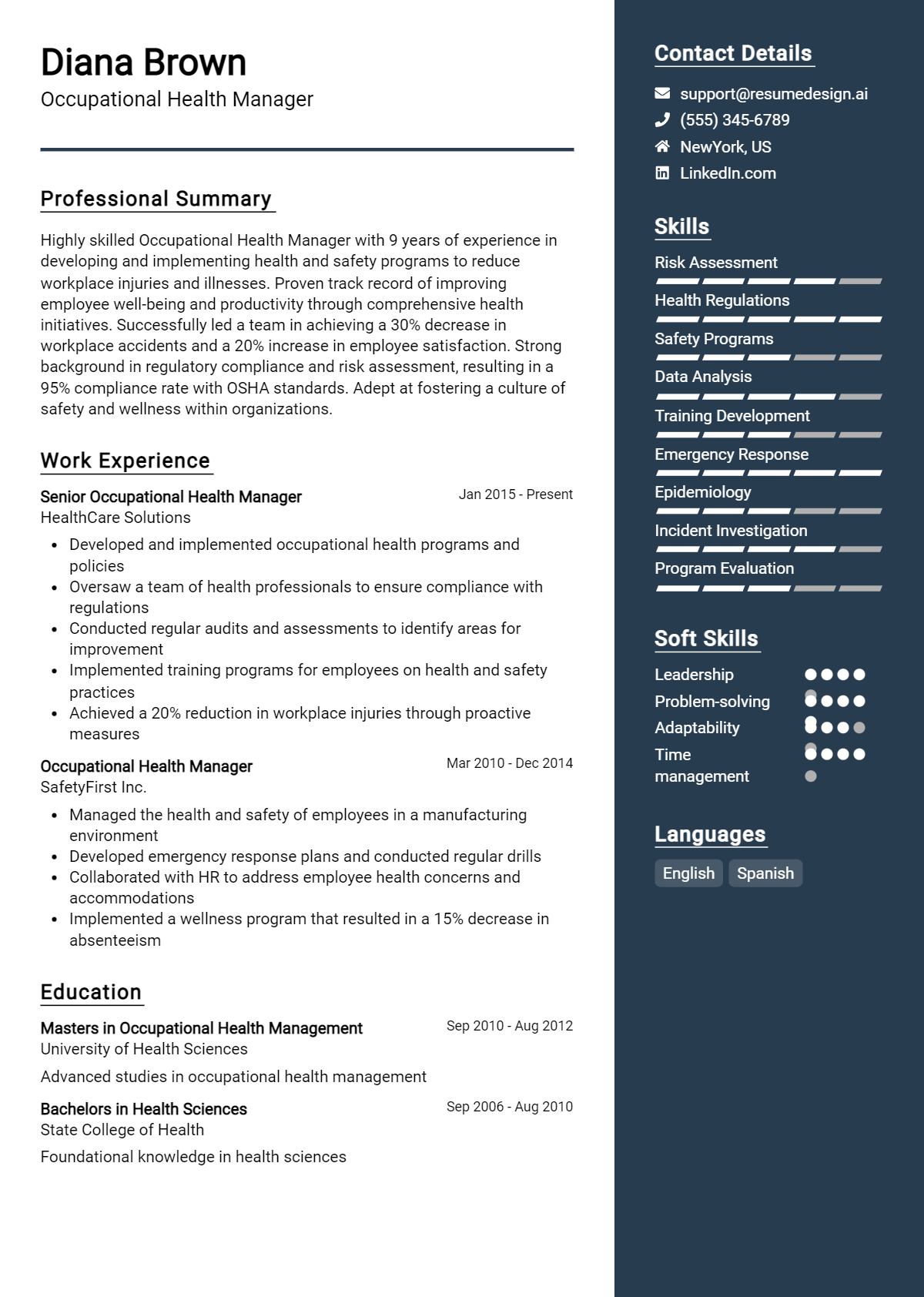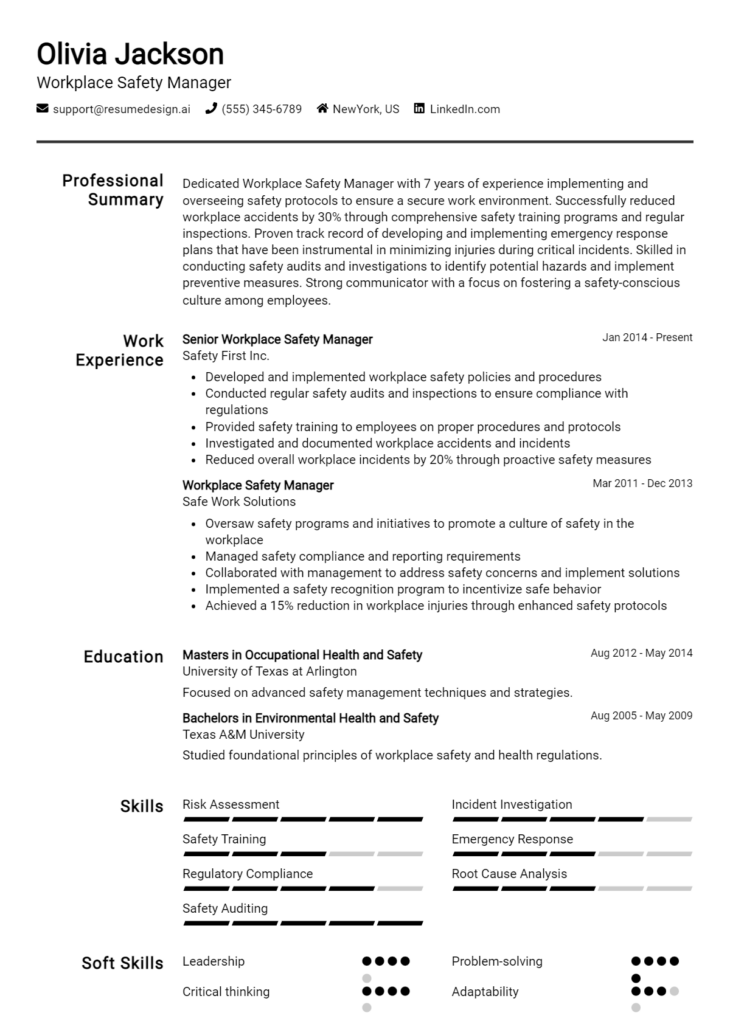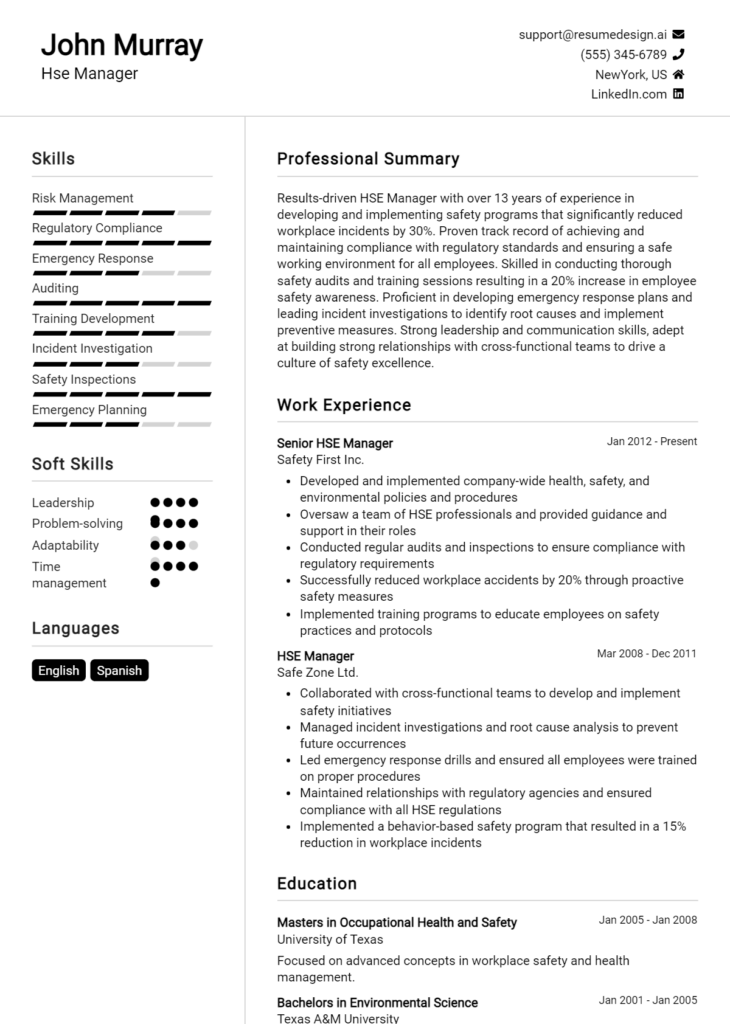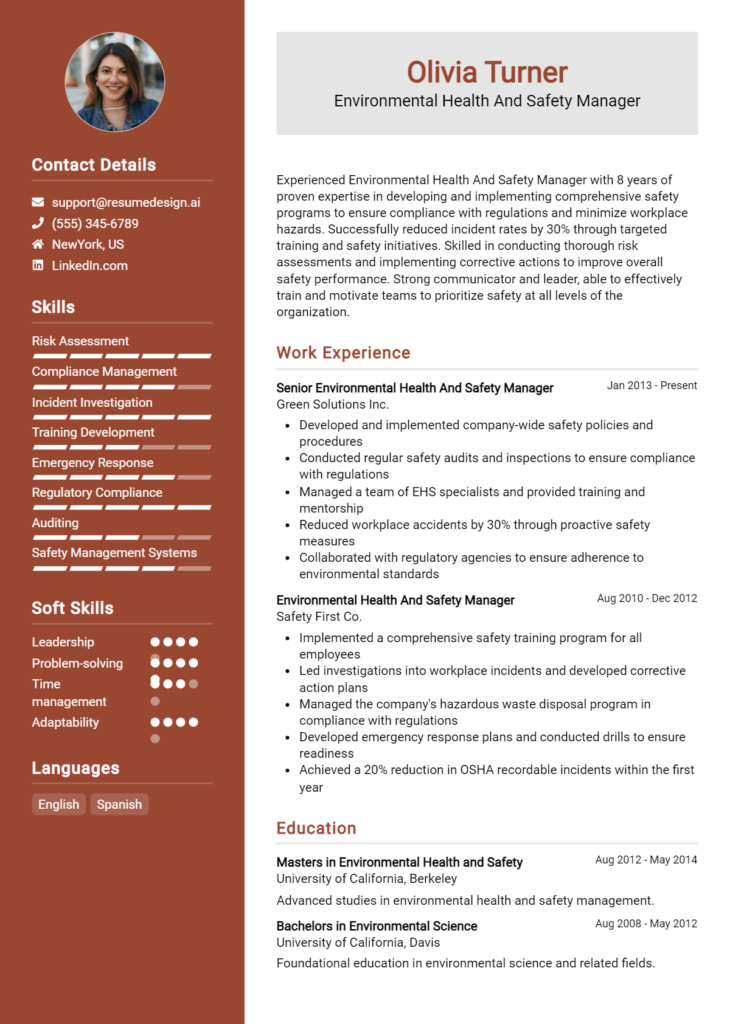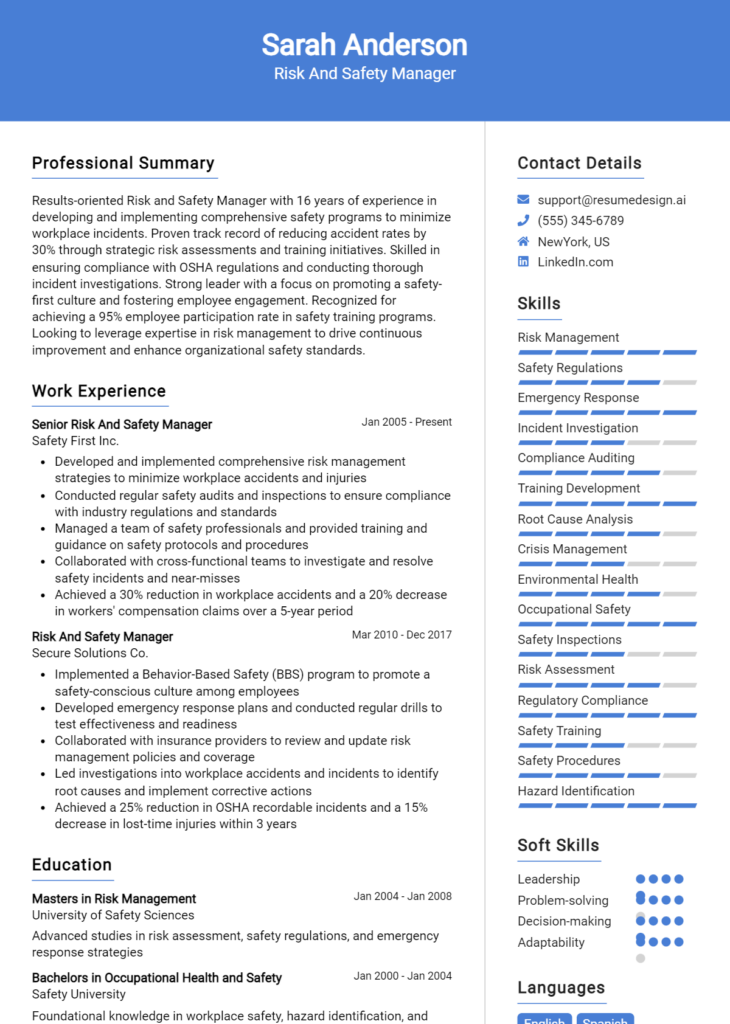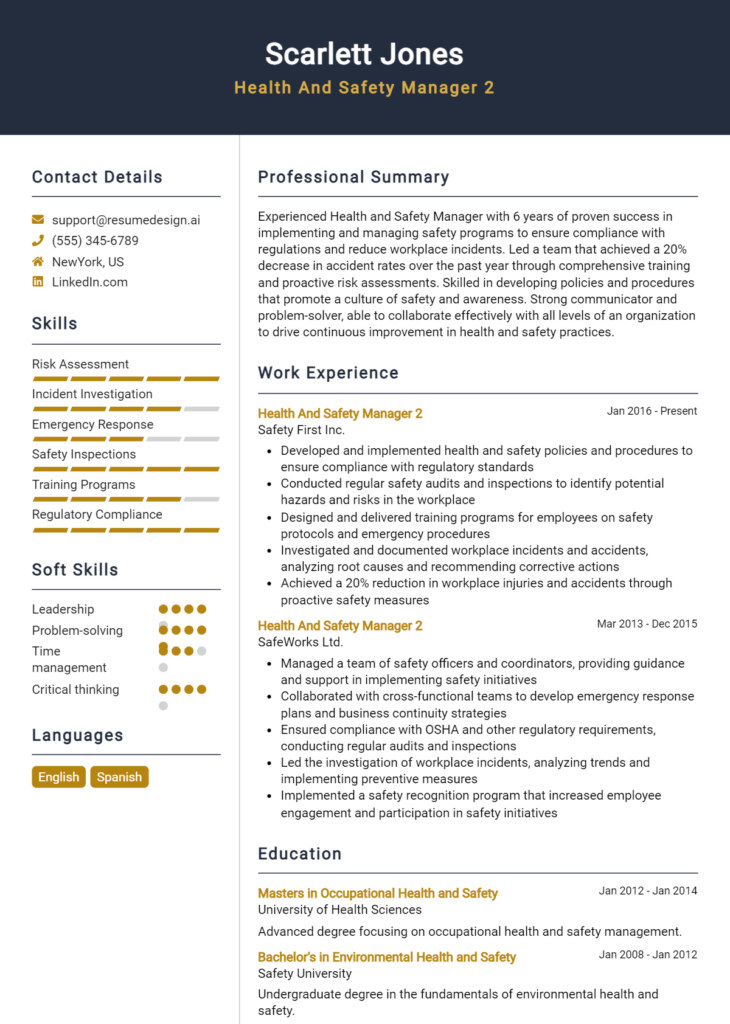Occupational Health Manager Core Responsibilities
The Occupational Health Manager plays a crucial role in promoting workplace safety and employee well-being by bridging various departments, including HR, safety, and compliance. Key responsibilities include developing health policies, conducting risk assessments, and ensuring regulatory compliance. Successful managers must possess strong technical knowledge, operational acumen, and problem-solving skills to address complex health issues effectively. These competencies contribute significantly to the organization's overall goals, and a well-structured resume can highlight these qualifications, enhancing career opportunities.
Common Responsibilities Listed on Occupational Health Manager Resume
- Develop and implement occupational health programs and policies.
- Conduct workplace health risk assessments and audits.
- Ensure compliance with health and safety regulations.
- Provide training and guidance on health-related matters.
- Collaborate with HR to manage employee health records.
- Monitor and analyze health data to identify trends.
- Facilitate communication between departments regarding health issues.
- Oversee health screenings and wellness initiatives.
- Conduct incident investigations and recommend corrective actions.
- Maintain up-to-date knowledge of industry regulations.
- Advise management on health-related risk management strategies.
- Lead health promotion activities and campaigns.
High-Level Resume Tips for Occupational Health Manager Professionals
In today's competitive job market, a well-crafted resume is essential for Occupational Health Manager professionals seeking to make a lasting impression on potential employers. Your resume is often the first opportunity to showcase your skills, achievements, and unique qualifications in the field of occupational health. Given the specialized nature of this role, it is crucial that your resume not only highlights your relevant experience but also reflects your understanding of industry standards and regulations. This guide will provide practical and actionable resume tips specifically tailored for Occupational Health Manager professionals, helping you to stand out in a crowded applicant pool.
Top Resume Tips for Occupational Health Manager Professionals
- Tailor your resume to the job description by incorporating specific keywords and phrases that match the requirements outlined by the employer.
- Highlight relevant experience in occupational health, safety management, and regulatory compliance to demonstrate your expertise in the field.
- Quantify your achievements by using metrics and data to showcase the impact of your work, such as reduction in workplace injuries or improvements in health program effectiveness.
- Include industry-specific skills, such as risk assessment, health promotion, and familiarity with OSHA regulations, to align your qualifications with the role.
- Utilize a clear and professional format that enhances readability, ensuring that your most important qualifications and experiences stand out.
- Incorporate a summary statement at the beginning of your resume that encapsulates your career goals and key accomplishments in occupational health management.
- Showcase your leadership and teamwork abilities by providing examples of how you've successfully collaborated with cross-functional teams to implement health initiatives.
- List relevant certifications, licenses, and continuing education that demonstrate your commitment to professional development in occupational health.
- Use action verbs and concise language to create a dynamic and engaging narrative of your career journey.
Implementing these tips can significantly increase your chances of landing a job in the Occupational Health Manager field. By presenting a polished and tailored resume, you not only communicate your qualifications effectively but also demonstrate your professionalism and attention to detail, setting the stage for a successful career in occupational health management.
Why Resume Headlines & Titles are Important for Occupational Health Manager
In the competitive field of occupational health management, the role of a resume headline or title cannot be overstated. A strong resume headline serves as a powerful introduction, capturing the attention of hiring managers and summarizing a candidate's key qualifications in just a few impactful words. This brief yet compelling phrase should be concise, relevant, and directly aligned with the specific job being applied for, effectively setting the tone for the rest of the resume. A well-crafted headline not only highlights a candidate's strengths but also demonstrates their understanding of the position, making it an essential element in the job application process.
Best Practices for Crafting Resume Headlines for Occupational Health Manager
- Keep it concise: Aim for a headline that is no longer than a single sentence.
- Be specific: Tailor the headline to reflect the key skills and experiences relevant to the job.
- Use impactful language: Choose strong action verbs and descriptive adjectives that convey expertise.
- Highlight achievements: Consider integrating quantifiable accomplishments that showcase your success.
- Align with job description: Incorporate key phrases from the job listing to resonate with hiring managers.
- Showcase certifications: If applicable, mention relevant certifications or licenses in the headline.
- Maintain professionalism: Ensure the tone is formal and appropriate for the occupational health field.
- Consider your target audience: Tailor your language to meet the expectations of potential employers in the industry.
Example Resume Headlines for Occupational Health Manager
Strong Resume Headlines
"Results-Driven Occupational Health Manager with 10+ Years of Experience in Workplace Safety and Compliance"
“Certified Occupational Health Specialist Committed to Enhancing Employee Well-Being and Reducing Workplace Injuries”
“Dynamic Occupational Health Manager with Proven Track Record in Implementing Effective Health Programs”
Weak Resume Headlines
“Occupational Health Manager”
“Experienced Professional Seeking Job”
The strong headlines are effective because they clearly convey the candidate's key strengths, such as years of experience, relevant certifications, and specific achievements in the field of occupational health. They immediately inform hiring managers of the candidate's qualifications, making them more likely to engage with the resume. In contrast, the weak headlines fail to impress because they are vague and generic, providing no insight into the candidate's unique skills or accomplishments. This lack of specificity can make a resume blend in with others, ultimately reducing the chances of standing out in a competitive job market.
Writing an Exceptional Occupational Health Manager Resume Summary
A resume summary is a crucial element for an Occupational Health Manager, as it serves as a powerful introduction that encapsulates the candidate's qualifications, skills, and achievements in a succinct manner. In the competitive job market, hiring managers often skim through resumes, making it essential for the summary to grab their attention immediately. A well-crafted summary not only highlights key competencies relevant to the role but also reflects the candidate’s unique professional journey and contributions to previous organizations. It should be concise, impactful, and meticulously tailored to align with the specific job description, ensuring that it resonates with the employer's needs and expectations.
Best Practices for Writing a Occupational Health Manager Resume Summary
- Quantify achievements: Use numbers to demonstrate the impact of your work, such as reduced injury rates or increased compliance.
- Focus on key skills: Highlight specific skills that are essential for the role, such as risk assessment, health and safety regulations, and employee training.
- Tailor to the job description: Customize your summary to reflect the qualifications and experiences mentioned in the job posting.
- Use impactful language: Employ strong verbs and precise terms to convey expertise and authority in occupational health management.
- Showcase relevant experience: Mention years of experience and specific industries worked in to establish credibility.
- Highlight certifications and training: Include any relevant certifications or specialized training that enhances your qualifications.
- Keep it concise: Aim for 3-5 sentences that encapsulate your professional identity without being overly verbose.
- Demonstrate leadership: If applicable, mention leadership roles or initiatives that showcase your ability to manage teams and projects effectively.
Example Occupational Health Manager Resume Summaries
Strong Resume Summaries
Dynamic Occupational Health Manager with over 10 years of experience in developing comprehensive health and safety programs, resulting in a 30% reduction in workplace injuries. Proven track record in conducting risk assessments and implementing employee wellness initiatives that improved overall employee satisfaction ratings by 25%.
Results-driven Occupational Health Manager with expertise in regulatory compliance and health risk management. Successfully led a cross-functional team to achieve a 40% decrease in OSHA violations over three years, earning recognition for excellence in workplace safety.
Experienced Occupational Health Manager with a strong background in data analysis and program development. Spearheaded a health initiative that increased employee participation in wellness programs by 50%, significantly lowering healthcare costs for the organization.
Certified Occupational Health Manager with 8+ years in the field, specializing in ergonomic assessments and training programs. Developed a workplace ergonomics strategy that decreased repetitive strain injuries by 20%, enhancing productivity and employee morale.
Weak Resume Summaries
Occupational Health Manager with experience in various roles looking for a new opportunity. I am dedicated and hard-working.
Motivated professional seeking to leverage my skills in occupational health management in a challenging new role. I have worked in health-related positions.
The strong resume summaries excel because they provide specific, quantifiable achievements, relevant skills, and demonstrate direct relevance to the Occupational Health Manager role. They use concrete examples that illustrate the candidate's impact and expertise. In contrast, the weak summaries are vague and generic, lacking specific outcomes or details that would entice a hiring manager to learn more about the candidate. These summaries fail to highlight the candidate's unique qualifications and contributions, making them less compelling in a competitive job market.
Work Experience Section for Occupational Health Manager Resume
The work experience section of an Occupational Health Manager resume is pivotal in demonstrating a candidate's expertise and impact within the field. This section not only showcases technical skills essential for managing occupational health programs but also highlights the ability to lead teams and deliver high-quality outcomes. By detailing specific achievements and aligning experiences with industry standards, candidates can effectively communicate their value to potential employers. Quantifying accomplishments with metrics and results is crucial in illustrating their contributions and the positive changes they have implemented within organizations.
Best Practices for Occupational Health Manager Work Experience
- Highlight specific technical skills relevant to occupational health management, such as risk assessment, policy development, and compliance monitoring.
- Quantify achievements with metrics, such as percentage reductions in workplace injuries or improvements in employee health outcomes.
- Demonstrate leadership by detailing experiences in managing teams, mentoring staff, or leading projects.
- Emphasize collaboration with stakeholders, including HR, safety teams, and external health professionals, to achieve common goals.
- Use action verbs to convey proactivity in roles and responsibilities, showcasing a results-oriented approach.
- Align experiences with industry standards and regulations to demonstrate familiarity and compliance with best practices.
- Include professional development experiences, such as certifications or training, that enhance your technical expertise.
- Tailor the experiences to the job description to ensure relevance and increase the chances of passing through applicant tracking systems.
Example Work Experiences for Occupational Health Manager
Strong Experiences
- Implemented a workplace wellness program that reduced employee absenteeism by 30% within the first year, improving overall productivity.
- Led a cross-functional team to develop and execute a comprehensive safety training initiative, resulting in a 25% decrease in workplace incidents over two years.
- Conducted over 150 occupational health assessments, leading to the identification and mitigation of health risks, which improved employee satisfaction scores by 15%.
- Collaborated with HR to revamp the employee health policy, ensuring compliance with OSHA regulations and reducing potential liability by 40%.
Weak Experiences
- Managed health-related tasks and projects as needed.
- Assisted in some safety training programs without clear outcomes.
- Participated in meetings regarding health initiatives.
- Worked on various projects related to employee health and safety.
The examples provided illustrate the difference between strong and weak experiences. Strong experiences are characterized by specific achievements, quantifiable outcomes, and clear demonstrations of leadership and collaboration, showcasing the candidate's ability to create significant impact. In contrast, weak experiences lack detail and measurable results, offering little insight into the candidate's actual contributions or effectiveness in the role. This highlights the importance of articulating work experiences in a way that conveys competence and accomplishments.
Education and Certifications Section for Occupational Health Manager Resume
The education and certifications section of an Occupational Health Manager resume is crucial as it serves as a testament to the candidate's academic foundation and professional commitment in a specialized field. This section not only highlights relevant degrees but also showcases industry-specific certifications and continuous learning efforts, essential for staying current in a dynamic field. By detailing relevant coursework and specialized training, candidates can significantly enhance their credibility and demonstrate their alignment with the demands of the Occupational Health Manager role, making them more attractive to potential employers.
Best Practices for Occupational Health Manager Education and Certifications
- List degrees in healthcare, occupational safety, or related fields to establish a solid educational background.
- Include relevant certifications, such as Certified Occupational Health Nurse (COHN) or Certified Safety Professional (CSP), to showcase professional expertise.
- Highlight continuing education courses that reflect current trends and regulations in occupational health.
- Provide details of specialized training programs, such as ergonomics or workplace wellness initiatives, that enhance your skill set.
- Use clear and concise formatting to ensure easy readability and quick identification of your qualifications.
- Prioritize listing the most relevant and advanced credentials first to capture the hiring manager's attention.
- Regularly update this section to include newly acquired qualifications and certifications to demonstrate commitment to professional growth.
- Consider adding affiliations with professional organizations, which can reflect a commitment to the field and networking opportunities.
Example Education and Certifications for Occupational Health Manager
Strong Examples
- Master of Science in Occupational Health and Safety, XYZ University, 2020
- Certified Occupational Health Nurse (COHN), 2021
- OSHA 30-Hour General Industry Safety and Health Certification, 2022
- Advanced Ergonomics Training, ABC Institute, 2023
Weak Examples
- Bachelor of Arts in History, ABC College, 2015
- Basic First Aid Certification (Expired), 2019
- Online Course in General Business Management, 2020
- Certification in Food Safety, 2018
The examples listed as strong are considered relevant and aligned with the Occupational Health Manager role, showcasing advanced degrees and certifications that reflect a commitment to the field. In contrast, the weak examples include irrelevant qualifications that do not contribute to the candidate's suitability for the role, such as outdated certifications or degrees outside of the healthcare and occupational safety domains. This demonstrates the importance of selecting educational and certification credentials that directly relate to the job requirements.
Top Skills & Keywords for Occupational Health Manager Resume
As an Occupational Health Manager, possessing the right skills is crucial for creating a safe and healthy work environment. A well-crafted resume that highlights both hard and soft skills can make a significant difference in standing out to potential employers. These skills not only demonstrate your technical expertise in occupational health and safety practices but also showcase your ability to communicate, lead, and manage teams effectively. By emphasizing these skills, you can illustrate your capability to handle the complexities of workplace health management, ensuring compliance with regulations and promoting overall employee well-being.
Top Hard & Soft Skills for Occupational Health Manager
Soft Skills
- Excellent communication skills
- Strong leadership abilities
- Problem-solving mindset
- Team collaboration
- Empathy and emotional intelligence
- Adaptability to change
- Time management
- Conflict resolution
- Critical thinking
- Attention to detail
Hard Skills
- Knowledge of occupational health regulations
- Risk assessment and management
- Familiarity with safety protocols and procedures
- Experience with health surveillance programs
- Proficiency in data analysis and reporting
- Emergency response planning
- Understanding of ergonomics
- First aid and CPR certification
- Experience with workplace assessments
- Familiarity with health and safety software
For more insights on the essential skills and how to effectively present your work experience, consider exploring additional resources that can strengthen your resume and enhance your job application.
Stand Out with a Winning Occupational Health Manager Cover Letter
I am writing to express my interest in the Occupational Health Manager position as advertised. With a robust background in occupational health and safety, combined with my passion for promoting employee well-being, I am excited about the opportunity to contribute to your organization. In my previous role at [Previous Company Name], I successfully developed and implemented health and safety programs that not only complied with industry regulations but also fostered a culture of wellness among employees.
In my experience, I have managed comprehensive health assessments and created effective strategies to mitigate workplace hazards. I believe that a proactive approach is essential in preventing occupational injuries and illnesses. By conducting regular training sessions and workshops, I have empowered employees with the knowledge and skills necessary to maintain their health and safety. My ability to collaborate with cross-functional teams has also enabled me to implement changes that enhance workplace ergonomics and promote mental health resources.
Furthermore, I am well-versed in analyzing health data to identify trends and areas for improvement. This analytical approach has proven invaluable in making informed decisions that lead to significant reductions in workplace incidents and health-related absenteeism. I am committed to continuous improvement and staying updated with the latest advancements in occupational health practices, ensuring that our programs are both effective and innovative.
I am excited about the possibility of bringing my expertise to [Company Name] and contributing to your commitment to employee welfare. I would welcome the opportunity to discuss how my background, skills, and enthusiasms align with the goals of your organization. Thank you for considering my application; I look forward to the possibility of working together to create a healthier and safer workplace.
Common Mistakes to Avoid in a Occupational Health Manager Resume
When crafting a resume for the role of an Occupational Health Manager, it’s crucial to present a professional and polished document that effectively highlights your qualifications and experience. However, many candidates make common mistakes that can detract from their overall appeal. Avoiding these pitfalls can significantly enhance your chances of landing an interview. Here are some frequent errors to be mindful of:
Vague Job Descriptions: Using generic descriptions for previous roles can leave hiring managers unclear about your specific responsibilities and achievements. Be specific about your duties and the impact you had in each position.
Neglecting Relevant Certifications: Failing to highlight pertinent certifications, such as Certified Occupational Health Nurse (COHN) or Certified Safety Professional (CSP), can undermine your qualifications. Ensure these are prominently displayed.
Overloading with Jargon: While industry-specific terminology demonstrates expertise, excessive jargon can alienate readers. Balance technical language with clear, straightforward explanations to maintain engagement.
Ignoring Quantifiable Achievements: Listing responsibilities without quantifying your contributions can make your accomplishments seem less impressive. Include metrics and outcomes to illustrate the effectiveness of your initiatives.
Inconsistent Formatting: A resume that lacks consistent formatting can appear unprofessional and difficult to read. Use uniform fonts, bullet points, and headings to create a cohesive look.
Including Irrelevant Experience: Including jobs that don’t relate to occupational health can dilute your resume’s focus. Tailor your experience to emphasize roles and skills that are directly applicable to the position.
Typos and Grammatical Errors: Simple mistakes in spelling or grammar can create a negative impression and suggest a lack of attention to detail. Always proofread your resume multiple times and consider using grammar checking tools.
Failing to Customize for Each Application: Sending out a generic resume can hinder your chances of standing out. Tailor your resume for each application by aligning your skills and experiences with the specific job requirements and company values.
Conclusion
As an Occupational Health Manager, your role is crucial in maintaining a safe and healthy work environment. Throughout this article, we have explored the key responsibilities of this position, including conducting health assessments, developing health programs, ensuring compliance with regulations, and fostering a culture of health and safety within the organization. Additionally, we have discussed the importance of continuous education and staying updated with the latest occupational health trends.
To enhance your chances of landing this pivotal role, it’s essential to have a well-structured resume that effectively showcases your skills and experience. Take a moment to review your Occupational Health Manager resume to ensure it highlights your qualifications and achievements in a compelling manner.
To assist you in this process, a variety of resources are available. You can find resume templates to help you format your document professionally, utilize the resume builder for a seamless creation experience, explore resume examples to inspire your content, and check out cover letter templates to complement your application.
Don’t miss the opportunity to refine your resume and stand out in the competitive job market for Occupational Health Managers. Start today!

